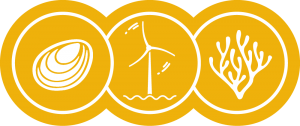The challenge
Imagine to be in the North Sea, 80 km away from the coast, on a harsh winter day. Imagine the wind blowing over 100 km/hour, the strong waves reaching up to 14 meters. And then imagine someone coming up and saying: “Hey, we’ve got a wind farm up here! Why don’t we also grow blue mussels and seaweed?”
UNITED goals
Thus, here we are talking about people who love challenges – and activities in UNITED will bring the challenge up to another level: they will test in reality the potential for blue mussels and seaweed cultivation in combination with wind energy production, something that has never been done before. If aquaculture proves to be feasible in such extreme conditions, it means that it is feasible almost anywhere, opening new opportunities for several Blue economy actors. The site is particularly fit for this scope, because it hosts standard wind turbines – thus ensuring the transferability of results to many other sites.
And, in turn, UNITED pilot is particularly fit for this site, because it gives researchers an opportunity to relate to similar sites in Belgium and the Netherlands, compare results, discuss and find solutions to shared challenges. The development of automated monitoring systems, for example, could spare researchers quite a few trips to the platform: this would maybe make their lives a bit less adventurous, but would definitely increase the economic viability of offshore operations.


